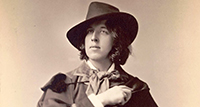
Oscar Fingal O'Flaherty Wills Wilde was an Irish writer and poet. He was born in Dublin on October 16, 1854. He is one of the most famous playwrights of the late Victorian period.
Oscar was the second child of Sir William Wilde's marriage. His brother William "Willy" was two years older. His father was Ireland's leading oto-ophthalmologist and was knighted in 1864 for his service as consultant physician and assistant special commissioner for the Irish census. His mother, Jane Wilde, was a socialite who wrote poetry about Ireland and the liberation movement, and she also introduced him to poetry. From an early age the boy grew up in an environment of poetry, which of course had an impact on his further development as a writer.
While studying at Oxford (1874-1878), Wilde first became interested in Freemasonry, but as he cooled toward the ideas of Freemasonry his attention was drawn to the ideas of aestheticism by attending lectures by John Ruskin and his student Walter Painter. The essence of this current is that aesthetics prevails over ethics. In other words, a work of art must be beautiful, but it need not conform to public taste. Oscar Wilde, whose works were often criticized as immoral, held similar beliefs for the rest of his life.
After graduation, he moved to London. The young man had no financial difficulties, the money left by his inheritance was enough to lead a secular life. Soon his literary activities began to bring him an income. At the age of 28, he became a prominent figure in the cultural life of London, and he was invited to lecture in the United States.
After returning from the United States, he went to Paris, where he met the brightest representatives of world literature (Paul Verlaine, Emile Zola, Victor Hugo, Stéphane Mallarmé, Anatole France, etc.) and won their sympathy.On his return from Paris, Wilde married and collaborated with various publications for several years, earning a living as a journalist. Until 1889 he edited the magazine A World of Women.
After the birth of children, the writer tried himself in a new genre. Oscar Wilde, whose fairy tales were published in 1888, showed himself as a talented children's writer. He wrote fairy tales for his sons, which later came out in the form of two collections – «The Happy Prince» and Other Tales, 1888 (containing tales of The Happy Prince, The Boy and the Giant, The Devoted Friend, The Wonderful Rocket) and The «A house of Pomegranates», 1891 (containing tales of The Young King, The Birthday of Infanta, The Fisherman and His Soul, The Star child).
In 1887 he published the stories "The Canterville Ghost," "Lord Arthur Savile's Crime" "The Sphinx Without a Mystery," and several others.
In 1890, Wilde published The Portrait of Dorian Gray, which caused a storm of emotions. Critics considered the novel scandalous and immoral, but the novel in turn brought Wilde enormous popularity.
In 1891 Wilde wrote the play Salome (French: Salomé) in French. The writer's interpretation of the biblical story caused a scandal in England and this one-act tragedy was banned for a long time.
In 1892 he wrote and directed his first comedy, «Lady Windermere's» Fan. In 1895 he wrote and directed two plays, «an Ideal Husband» and «The Importance of Being Serious». In these three works manifested all the wit of Wilde, manifested in dialogues. The newspapers called him "the best of modern playwrights," noting his intelligence, originality, perfection of style, sharpness of thought, sharpened paradoxes.
In 1895, Wilde was sentenced to two years for immorality
Wilde's last two works are of great artistic power. They are the prose confession «De Profundis», written during imprisonment and published posthumously, and the poem «The Ballad of Reading Gaol», written soon after his release and published under the pseudonym C.3.3 (Wilde's prisoner number).
In May 1897, after his release from prison, Oscar Wilde moved to France" and changed his name to Sebastian Melmoth
One of the most brilliant and sophisticated aesthetes of nineteenth-century England lived out his last years in poverty and loneliness in filthy furnished rooms on the outskirts of Paris. Oscar Wilde died unexpectedly on November 30, 1900 of acute meningitis.

